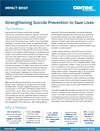Increasing Access to Suicide Prevention Care Saves Lives
09/09/2022

September is recognized as National Suicide Prevention Month, shining light on the need to strengthen access to suicide prevention care to save lives. Suicide is the 12th leading cause of death in the United States, resulting in more than 45,000 deaths annually.[1] Additionally, there are 25 suicide attempts for every death by suicide.[2]
While there is no one single cause for suicide, access to mental health services and preemptive treatment have long been a barrier to prevention. The much-anticipated launch of the National 988 Suicide & Crisis Lifeline was a significant step toward breaking down barriers to accessing care by providing text, online, and telephonic crisis support 24/7. In the first week of the 988 changeover, there was a 45% increase in Lifeline use from the previous week, further solidifying the three-digit codes impact on accessibility for suicide response and mental health crisis care.[3] At Centene, we continue to support federal and state legislation that encourages continued funding for the expansion of 988, and promote the availability of the three-digit code among our members in communities nationwide as a means of accessing critical crisis prevention.
As a leader in managed care dedicated to the whole health of our members, Centene continues to advance solutions that encourage suicide awareness and prevention. Our suicide prevention solution — Choose Tomorrow™ — leverages risk identification, evidence-based intervention, and follow-up care to provide inclusive, culturally sensitive care. Comprehensively trained staff use evidence-based practices to screen for suicide risk, develop member-driven safety planning, and monitor members’ treatment progress to improve outcomes and prevent suicide. This holistic approach to intervention promotes connection to services and supports unique to the member to address the multiple aspects of their lives, including social determinant barriers, stigma, and access to care.
Centene has embraced our opportunity and responsibility to take a leading role in efforts to reduce suicide and attempts. Our recent Impact Brief outlines our continued efforts to address barriers in suicide prevention. By supporting healthcare providers, employing skilled clinicians, utilizing data to identify those at risk, and engaging individuals in their recovery through best practice interventions, we strive to improve health outcomes and save lives.
If you or someone you care about is thinking about suicide, seek help right away. Call 911 or dial 988 to reach the National Suicide & Crisis Lifeline to access 24/7, free and confidential emotional support for suicidal crisis or emotional distress.
